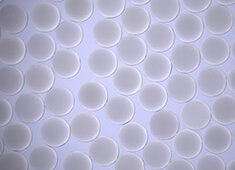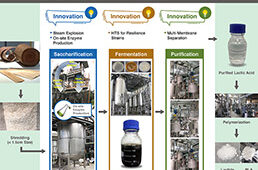Just don’t call it a weed. A variety of Russian dandelion generates a sap-like substance in its roots that is well-suited for doing the job of petroleum in commercial plastics. Ford has jumped on the project. Image: Ohio State University |
The “Russian dandelion,” Taraxacum kok-saghyz
(TKS), is being domesticated at Ohio State University’s Ohio
Agricultural Research and Development Center’s (OARDC) Wooster campus
and produces high-quality natural rubber in its fleshy taproot. Its
performance mirrors the natural rubber produced from Hevea brasiliensis
(the Brazilian rubber tree). According to its developers, natural
rubber provides performance characteristics not available from
synthetic, petroleum-derived rubber for trucking, construction, and
aviation tires.
Natural rubber produced from Hevea is
the only commodity volume source for tires and rubber industrial
products in the world. Current shortage of supply has driven a six-fold
price increase since 2002. Tests of TKS rubber produced in Wooster have
found the material to be of comparable quality to Hevea rubber. An important additional product of TKS cultivation is ethanol.
The
project was announced by Ford on Tuesday, and company engineers are
testing the substance to determine its durability. Initially, the
research will focus on the substance’s potential use as a strengthener
for impact plastics.
“Managing
weed problems is essential to developing TKS as a commercially viable
domestic source of natural rubber in the U.S.,” said Bill Ravlin,
associate director of OARDC.
Ford
could potentially use the substance as a plastics modifier, to help
improve the impact strength of plastics. The material might then be used
in places such as cupholders, floor mats and interior trim. Ford has
previously used sustainable materials in its vehicles including soy foam
seat cushions, wheat straw-filled plastic for interior trim and
recycled cotton from blue jeans as sound-dampening material
A
collaboration including the Ohio State University, the University of
Akron, Oregon State University, Cooper Tire and Bridgestone Americas
received a $3 million Third Frontier Wright Projects Program grant
through the Ohio Department of Development to develop a new industry
based on this renewable, domestic source of natural rubber. Most of the
funding was targeted to building a pilot-scale processing facility on
OARDC’s Wooster campus that will generate 20 metric tons of rubber per
year for industrial testing.
“It’s
strange to see weeds being grown in perfectly manicured rows in a
greenhouse, but these dandelions could be the next sustainable material
in our vehicles,” said Harris.
Before
the dandelion-derived rubber can be put to use, Ford researchers will
assess the initial quality of the material to evaluate how it will
perform in a variety of plastics that are used in vehicles and to ensure
it meets durability standards.
Besides
the dandelion, the team also is looking into the use of guayule (a
southwestern U.S. shrub) as a natural rubber, which is provided by OARDC
and can also be grown domestically.
Ohio Third Frontier Wright Projects Program





